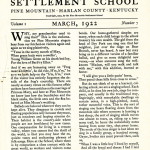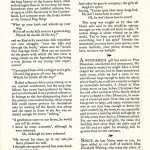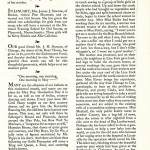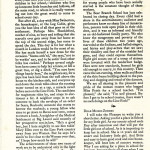Pine Mountain Settlement School
Series 17: PUBLICATIONS PMSS
NOTES – 1922
March

“Folk-Songs” by Cecil Sharp and Chas. Farnsworth, page 4. [sharp0007.jpg]
NOTES – 1922
“Notes from the Pine Mountain Settlement School”
1922 March
GALLERY: NOTES – 1922 March
“We do not let in popular airs, in order that the children may not forget their own songs, a richer heirloom for them than stocks and bonds.”
- NOTES – 1922 March, page 1. [PMSS_notes_1922_mar_001.jpg]
- NOTES – 1922 March, page 2.[PMSS_notes_1922_mar_002.jpg]
- NOTES – 1922 March, page 3.[PMSS_notes_1922_mar_001.jpg]
- NOTES – 1922 March, page 4.[PMSS_notes_1922_mar_004.jpg]
TAGS: NOTES – 1922 MARCH: ballads lyrics, Chapel, donation, letter from Josiah Cooper, Elizabeth Whiting, Wilmer Stone, Margaret Coolidge, Frances Gilbert, Mrs. James J. Storrow, Helen Osborne Storrow, Joseph Smith Duncan, Cecil Sharp, Aunt Sal’s Song, Katherine Pettit, Lucretia Garfield, Florence Reeves, National Training School for Girl Scouts, scholarships, Kitty Ritchie, Allie Callahan, Endowment Fund, dancing, Marguerite Butler, Line Fork Settlement, Anne Pavey, Anne Medcalf, Mabel Mumford, Lena Swinerton, Bear Branch School, Coyle Branch School, Log Cabin
TRANSCRIPTION: 1922 MARCH
P. 1
NOTES FROM THE
PINE MOUNTAIN
SETTLEMENT SCHOOL
PINE MOUNTAIN * HARLAN COUNTY * KENTUCKY
Copyright, 1922 by Pine Mountain School, Inc.
Volume I MARCH, 1922 Number 1
WHY, grandmother used to sing that!” This is the exclamation we Pine Mountain singers hear from our fotched-on visitors again and again as we sing plaintively,
“Twas in the merry month of May,
When green buds were a-swellin’,
Young William Green on his death-bed lay,
For the love of Barb’ry Ellen.”
And if we are humming away on “Frog went a courtin’, he did ride, H’m, h’m,” be sure we have help on the “h’m, h’m,” even if the visitor has entirely forgotten the details of the frog’s courtship. There are nearly as many verses in this famous affair as there have been articles on the marriage of Princess Mary, and here at Pine Mountain we know just how the bumblebee and the black snake, the little ants and the flea behaved at Miss Mouse’s wedding.
Ballads are loved wherever hey can be kept alive. They disappear in crowds and floating populations only because they must, just as meadows and leaping streams do. Their habitat is the country-side, where people are not bewildered by new tunes. One compensation for living in a remote valley, where you cannot feel the thrill of the world, Is that you may hear the exquisite tunes and enchanting phrases of folk-songs. Here at the School, where there is by comparison a close contact with a great world, as workers and visitors come and go, we preserve the ancient isolation of the hills by a rigid censorship of songs. We do not let in popular airs, in order that the children may not forget their own songs, a richer heirloom for them than stocks and bonds. Our home-gathered [samples] are many, when each child brings to the school treasury his own wealth. The girls from the head of Dry Fork can sing one that her neighbor just over the ridge on Bear Branch, never has heard. A new boy may bring us in a different version of a familiar ballad, and give us some delightful new verses, — as when someone sang the well-known “Madam, will you walk and talk with me,” With this edition, learned at home:
” I will give you a little pacin’ horse,
That paced these heels from cross to cross.”
But do not think of us as a learned, collecting school; we are a singing school. Each child, as he does his own job, sings for company, and usually in the traditional way, lingeringly, with remarkable dwellings on certain notes, in a high-pitched, nasal, rather mournful voice. This is the sort of singing one hears floating down from the mountainside, when someone is hunting a lost sheep, the sort of singing which moves one almost to tears, as riding up a lonesome trail, he hears the melancholy notes issuing from some tiny, shut-away home. The mode of the lone singer is lost when we sing in a family group, a hundred strong. Gayer, livelier airs must prevail then, such as,
” When I was a little boy, I lived by myself,
And all the bread and cheese I had. I laid upon the shelf,
Wing wong waddle to my Jack straw straddle,
To my John fare faddle
To my long ways home.”
P. 2
…or charming things from Mr. Cecil Sharp‘s collection of English folk songs, like the “Wraggle Taggle Gypsies” and ” Jackie Boy.”
The subjects of our ballots hold the mirror up to nature. Love, jealousy, murder, faithfulness, — we sing of all these themes, and through the song, look back on the long history of the human heart, often with thoughts that do lie too deep for tears. Sometimes they are fateful pictures, too, of aspects of life found only in the Cumberlands. Let someone start the lively strains of the Ground Hog Song:
“Whet up your knife and whistle up your dog,
We’re off to the hills to hunt a ground hog,
Whack fal doodle all the day!”
and we Kentucky Mountain folk remember our own struggles “over the hills and through the bresh,” where once we “struck that hog-sign fresh.” How can we account for the gusto with which the last verse is sung, except on the hypothesis of its being the true picture of our young.’uns experiences?
“Up stepped Susie with a snigger and a grin,
Ground-hog, grease all over her chin,
Whack fal doodle all the day!”
Ballad collectors have come among us to our mutual enrichment, but the song that follows has never been gathered by them, and is not included in any printed collection. It belongs to the fast-disappearing days of the pioneer, one-roomed house, where young folk could secure privacy for themselves only by waiting till the family was asleep. And the space in front of the fire was secluded enough for lovers “talking.”
“A gentleman came to our house, he would not tell his name;
I knew he came a courtin’, although he were ashamed,
Oh, although he were ashamed.
“He moved his cheer up to my side, his fancy pleased me well,
I thought the sperrit moved him some handsome tale to tell.
“Oh, thar he sot the lifelong night, and never a word did say:
With many a sigh and bitter groan he oft-times wished for day.
“The chickens they begun to crow, and day-light did appear,
‘How d’ye do, good morning, Sir! I’m glad to see you here!’
He was weary of the livelong night, he was weary of his life.
If this is what you call courtin’, boys, I’ll never take a wife.
And when he goes in company, the girls all laugh for sport,
Saying, ‘Yander goes that same dang-fool,
He don’t know how to court!
Oh, he don’t know how to court.
This song was taught us by that old friend who said to the would-be spinner amongst us who could not learn to spin; “I reckon things is about evened up in this world. You’ve been everywh’ars and seen everything, but I kin spin!” Outside the mountains you may have your operas, your music festivals, your prima donnas, but here, we have our ballads!
*****
A WONDERFUL gift has come to Pine Mountain, unsolicited and unexpected. Always wished that we might have a little chapel for service, but in these unendowed early years, while we had a room in our school house large enough to hold the whole school family, we could not consider a chapel an immediate necessity. A friend in New Jersey wrote us just before Christmas that she and other members of the family wished to give a chapel to Pine Mountain, in memory of a beloved aunt. Now that our family has grown so large, and many visitors come who do not stay long enough to know the spirit underlying the work, we are especially glad to have a building which will signify to all who come that this is a Christian school. For our own boys and girls, the value of a building shut away from the daily uses of our life and set apart for worship will be greater than we can estimate.
*****
Since the last Notes went to you, we have added to our staff of workers, Miss Elizabeth Whiting, who takes the place of Miss Wilmer Stone, [Helen Wilmer Stone Viner] absent on six months leave; Miss Margaret Coolidge of Milton, Massachusetts, who is helping with Girl Scouting, folk dancing, playground, and office work in the absence of Miss [Lucretia] Garfield;…
P. 3
…and Miss Frances Gilbert of Manchester, Kentucky, who is housemothering, and taking care of the poultry. Miss Florence Reeves of Montclair, New Jersey, calls herself a visitor, but she is invaluable to us as assistant to the primary teacher and in many other ways. Dr. [Grace] Huse has been at home this winter, owing to the grave illness of her mother.
*****
IN JANUARY, Mrs. James J. Storrow, of Boston, visited Pine Mountain and reviewed our Girl Scouts. She has given the school two scholarships for girls from our group who will have a summer at the National Training School for Girl Scouts, Plymouth, Massachusetts. These girls will be Kitty Ritchie and Allie Callahan.
*****
Our good friend, Mr J. H. Duncan [Joseph Smith Duncan] of Chicago, the donor of the Boys’ House has given us $15,000 for the Endowment Fund, and thereby doubled its size. We are more grateful than words can tell for this thoughtful generosity, which helps us at our weakest point.
*****
“One morning, one morning,
One morning in May ——“
MANY are the allusions of our ballads to this enchanted month, and many are our plans for May Day. Graduation Day, it is for us, as well as one of frolics, country dancing and shows. Every year since Mr. Cecil Sharp taught us our first country dances. And we gave him the Kentucky Running Set, the children have learned new dances. This year, not only. will there be Sellenger’s Round and Peascods, danced around the May Pole, but Row Well Ye Mariners, a “longways for as many as will,” Hunston House, that dance of quiet grace and courtesy, and Hey Boys, Up Go We, a jolly twist of figures mentioned by Mr. Pepys in his diary. And there are hints that, following our Guild Procession will come a King and Queen, a Fool, and a careering hobby-horses.
*****
UP a wood road that leads you through virgin forest, disappearing sometimes in the creek-bed and sometimes leaping over a fallen tree, then out of the woods and down Line Fork Valley, where the neighbors live scarcely a sight apart and Pine Mountain, above them, stretches away for miles and miles to Kingdom Come, — this is the journey you must take to our Line Fork Settlement, seven miles away. Our extension worker, Miss Marguerite Butler, began to ride over this trail regularly three years ago, to teach sewing to a group of little girls at the district school. Up and down the creek people who had brought us vegetables and fur hides, eggs, and split-bottomed chairs to trade, began to know the school women in another way. After Miss Butler had been working there for six months, a woman was elected trustee of the district school, and came to Miss Pettit saying, “I want you to get me a teacher for the Bear Branch School. The men at the mill whar I was, this morning, was a- tellin’ me whar I could get me a teacher that’d whup the young’un’s good and larn ’em that-a-away, but I don’t foller whuppin’s, an’ I want me a good teacher.”
The teacher was promised, and on their part, the neighbors at Line Fork gave land, and logs to build the six-room house; several. at several workings, the men gave their time and the walls were raised. Four workers now live under the cosy roof of the Line Fork Settlement, and all the world comes to their door. Miss [Anne] Pavey brings her experience gathered all the way from Chicago to constant to noble, to bear on the problems of Minerva, and pretty Cindy, and Arlena, girls who are trying honestly to take a stand in the community as all the evils of mining towns come into their valley from across the mountain, and are added to the existing evils of a moonshine-making country. Miss [Anne Ruth] Medcalf, the only public health nurse in Letcher County, has a bag-full of news, when she comes in after nightfall from a ride over the head of Big Leatherwood. Perhaps she has been called to dress a gunshot wound, or help a new baby into the world, or care for the old man who because of her urging went to the hospital in Louisville for the operation which saved his life. The other day, thinking about the beautiful nativity play which had been given at the settlement on Christmas, he said to her, “Me and Jake Lewis was a-studyin’ about hit, an’ I said that the reason you women give that play was that the 25th day of De-cember was Christes birthday, but Jake contended hit were the day when the…
P. 4
…U-nited States gained her independence. Now you show me in the Bible whar hit’s sot down that Christ was borned on the 25th day of De-cember.”
Since the closing of her school at Coyle Branch in February, Miss Mabel Mumford has gone to the University of Chicago to study, that next year may mean more to the children in her school, — children who live up lonesome little branches and hollows, off the main road, to whom it is really venturing out into the great world to come to school every day.
But after all, a day with Miss Swinerton, the housekeeper, at the Log Cabin, gives you the best idea of all that goes on at the settlement. Perhaps Mrs. Shackleford, mother of nine, so busy and toiling that she scarcely ever gets away from her home at the top of the second ridge, has come to spend the day. This day is for her what a month in London would be for most of us. She has made herself a new dress for the occasion. “Seems awk’rd,” she says, “not to be workin’ any, and to be eatin’ food other folks has cooked.” Perhaps several neighbors have come to help lay a fence, or fell a great tree, or dig a ditch. “You sure have things handy here,” The neighbors say, for a pipe has been laid from the well above the house to the kitchen sink, and everyone up and down the creek talks about the running water turned on at a tap, a miracle never before seen on the Line Fork. The candidate for magistrate rides by, and stops to electioneer a bit. A neighbor stops in to ask someone to back the envelope of an order for Sears, Roebuck; someone else wants to borrow the wash tub; a young fellow who aims to go down to Berea next term, comes to return a book. A neighbor of the Medical Settlement at Big Laurel said recently of her prospective son in law, “He’s a good boy, but I hate mightily to see him takin’ Mary Ellen over to Line Fork country away from you Women. But he says he’s aimin’ to live close to the Women over there, an’ I hope how-much he will!”
The achievements of these two years of work are to be understood only in the light of what “the Line Fork Country” was like before the settlement was started, and the problems and discouragements that must continually be faced. For instance, Sunday School attendance has fallen off since pistol carrying and shooting, — generally consequences of a worse evil, — have increased so that mothers of young children are justly fearful. The mother of a particularly difficult lad once said to us, as she watched our boys and girls doing their ancient country dance, the running set, on our playground, that the best thing the school had done was to show young people how to have innocent fun. How to provide the right sort of food for young people who have been socially starved is the constant thought of these workers.
The Bear Branch School has just celebrated its closing day. Every child had a share in the entertainment; audience and performers knew no sharp line of demarcation, parents took open pride in their children, and it was as informal and friendly as an old-fashioned family party. We who knew the meagreness and poverty of the lives of these children two years ago, marveled at the Indians, and ballad-singers, and fairies and play-actors that we saw; their timidity and fear of the outsider had gone, and they could express themselves. Eight girl scouts out of a troup of sixteen were invested with the tenderfoot badge. Here were new standards, framed for girls old enough to marry, in this country. Then came the set-running, when walls and floors of the thin frame building shook to the patting and clapping and tread of the dancers.
We are all sharing in the pleasure and pride of the woman trustee who begged Miss [Katherine] Pettit for a school teacher. “I’m pleased,” she said; “I’m well pleased. Before I got to be school trustee, there wasn’t no such doings on the Line Fork!”
*****
DEAR MISSES ZONDES
I will take the Pleasure to write you a short letter. Asking you for a place in School for my little girl. As our county school ends Day after tomorrow and that will put the little girl out of school. As it is importing to keep her in school. She is 12 years old and smart and Industry little girl. And Brite and easy to learn good cook and nice housekeeper, will beat lots of country women. Why I am asking for a place in school for her now, because she is all alone when I am gone away. Can I get a place for her in school. Hope I can get her in Pine Mountain. Please let me know as I must take her to school somewere. Please give me terms for month. Yours Truly Friend, JOSIAH COOPER.
[4]
The Marchbanks Press
New York
Previous:
NOTES – 1921
Next:
NOTES – 1923
See Also:
LINE FORK Settlement
PMSS Song Ballads and Other Songs 1923
Return To:
NOTES – Index





